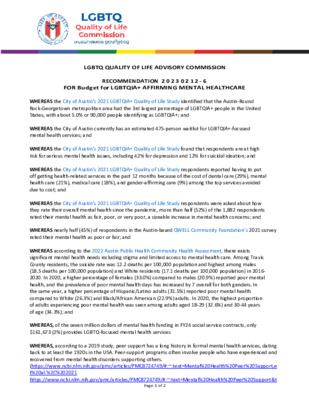Backup — original pdf
Backup

LGBTQ QUALITY OF LIFE ADVISORY COMMISSION RECOMMENDATION 2 0 2 3 0 2 1 2 ‐ 6 FOR Budget for LGBTQIA+ AFFIRMING MENTAL HEALTHCARE WHEREAS the City of Austin’s 2021 LGBTQIA+ Quality of Life Study identified that the Austin‐Round Rock‐Georgetown metropolitan area had the 3rd largest percentage of LGBTQIA+ people in the United States, with about 5.0% or 90,000 people identifying as LGBTQIA+; and WHEREAS the City of Austin currently has an estimated 475‐person waitlist for LGBTQIA+‐focused mental health services; and WHEREAS the City of Austin’s 2021 LGBTQIA+ Quality of Life Study found that respondents are at high risk for serious mental health issues, including 42% for depression and 12% for suicidal ideation; and WHEREAS the City of Austin’s 2021 LGBTQIA+ Quality of Life Study respondents reported having to put off getting health‐related services in the past 12 months because of the cost of dental care (29%), mental health care (21%), medical care (18%), and gender‐affirming care (9%) among the top services avoided due to cost; and WHEREAS the City of Austin’s 2021 LGBTQIA+ Quality of Life Study respondents were asked about how they rate their overall mental health since the pandemic, more than half (52%) of the 1,882 respondents rated their mental health as fair, poor, or very poor, a sizeable increase in mental health concerns; and WHEREAS nearly half (45%) of respondents in the Austin‐based QWELL Community Foundation’s 2021 survey rated their mental health as poor or fair; and WHEREAS according to the 2022 Austin Public Health Community Health Assessment, there exists significant mental health needs including stigma and limited access to mental health care. Among Travis County residents, the suicide rate was 12.2 deaths per 100,000 population and highest among males (18.5 deaths per 100,000 population) and White residents (17.1 deaths per 100,000 population) in 2016‐ 2020. In 2020, a higher percentage of females (33.0%) compared to males (20.9%) reported poor mental health, and the prevalence of poor mental health days has increased by 7 overall for both genders. In the same year, a higher percentage of Hispanic/Latino adults (31.5%) reported poor mental health compared to White (26.3%) and Black/African American (22.9%) adults. In 2020, the highest proportion of adults experiencing poor mental health was seen among adults aged 18‐29 (32.6%) and 30‐44 years of age (34.3%); and WHEREAS, of the seven million dollars of mental health funding in FY24 social service contracts, only $161,673 (2%) provides LGBTQ‐focused mental health services WHEREAS, according to a 2019 study, peer support has a long history in formal mental health services, dating back to at least the 1920s in the USA. Peer‐support programs often involve people who have experienced and recovered from mental health disorders supporting others. (https://www.ncbi.nlm.nih.gov/pmc/articles/PMC8724749/#:~:text=Mental%20Health%20Peer%20Support,e t%20al.%2C%202021 https://www.ncbi.nlm.nih.gov/pmc/articles/PMC8724749/#:~:text=Mental%20Health%20Peer%20Support&t Page 1 of 2 ext=Peer%20support%20has%20a%20long,et%20al.%2C%202019). WHEREAS a 2021 study found that connectedness with peers and affiliation with a broader LGBTQ community has been identified as beneficial to those trying to cope with stressors; and WHEREAS in the annual Health Disparities Report Card released by Integral Care in FY23, significant findings included that death by suicide was 13.5x higher among Transgender persons served by Integral Care compared to the group with the lowest rates (cisgender females). When stratifying by sexual orientation, death by suicide was also 2.8x higher among Lesbian, Gay, and Bisexual (LGB) persons served and; WHEREAS since FY2020, existing health equity contracts funding LGBTQIA+ services have not received a cost‐ of‐living increase; and WHEREAS all current health equity contracts will compete as part of a competitive RFP process for FY 2025 NOW, THEREFORE, BE IT RESOLVED that the LGBTQ Quality of Life Commission recommends that the Austin City Council directs $300K annual funding for culturally appropriate free or low‐cost LGBTQIA+ affirming mental healthcare, and/or peer support services. Additionally, we recommend the LGBTQ Quality of Life Advisory Commission be included in drafting the scope of work for the request for proposal process. Record of the Vote: Adopted without objection on an X‐X vote. VOTE Date of Approval: Present: Attest: Page 2 of 2